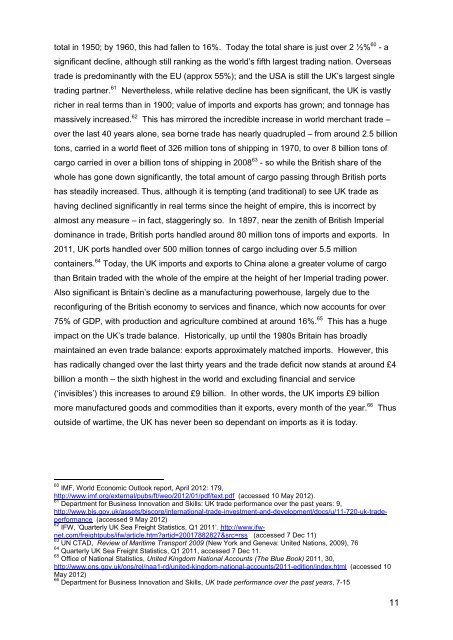90 percent by sea - Defence Academy of the United Kingdom
90 percent by sea - Defence Academy of the United Kingdom
90 percent by sea - Defence Academy of the United Kingdom
You also want an ePaper? Increase the reach of your titles
YUMPU automatically turns print PDFs into web optimized ePapers that Google loves.
total in 1950; <strong>by</strong> 1960, this had fallen to 16%. Today <strong>the</strong> total share is just over 2 ½% 60 - a<br />
significant decline, although still ranking as <strong>the</strong> world’s fifth largest trading nation. Over<strong>sea</strong>s<br />
trade is predominantly with <strong>the</strong> EU (approx 55%); and <strong>the</strong> USA is still <strong>the</strong> UK’s largest single<br />
trading partner. 61 Never<strong>the</strong>less, while relative decline has been significant, <strong>the</strong> UK is vastly<br />
richer in real terms than in 1<strong>90</strong>0; value <strong>of</strong> imports and exports has grown; and tonnage has<br />
massively increased. 62 This has mirrored <strong>the</strong> incredible increase in world merchant trade –<br />
over <strong>the</strong> last 40 years alone, <strong>sea</strong> borne trade has nearly quadrupled – from around 2.5 billion<br />
tons, carried in a world fleet <strong>of</strong> 326 million tons <strong>of</strong> shipping in 1970, to over 8 billion tons <strong>of</strong><br />
cargo carried in over a billion tons <strong>of</strong> shipping in 2008 63 - so while <strong>the</strong> British share <strong>of</strong> <strong>the</strong><br />
whole has gone down significantly, <strong>the</strong> total amount <strong>of</strong> cargo passing through British ports<br />
has steadily increased. Thus, although it is tempting (and traditional) to see UK trade as<br />
having declined significantly in real terms since <strong>the</strong> height <strong>of</strong> empire, this is incorrect <strong>by</strong><br />
almost any measure – in fact, staggeringly so. In 1897, near <strong>the</strong> zenith <strong>of</strong> British Imperial<br />
dominance in trade, British ports handled around 80 million tons <strong>of</strong> imports and exports. In<br />
2011, UK ports handled over 500 million tonnes <strong>of</strong> cargo including over 5.5 million<br />
containers. 64 Today, <strong>the</strong> UK imports and exports to China alone a greater volume <strong>of</strong> cargo<br />
than Britain traded with <strong>the</strong> whole <strong>of</strong> <strong>the</strong> empire at <strong>the</strong> height <strong>of</strong> her Imperial trading power.<br />
Also significant is Britain’s decline as a manufacturing powerhouse, largely due to <strong>the</strong><br />
reconfiguring <strong>of</strong> <strong>the</strong> British economy to services and finance, which now accounts for over<br />
75% <strong>of</strong> GDP, with production and agriculture combined at around 16%. 65 This has a huge<br />
impact on <strong>the</strong> UK’s trade balance. Historically, up until <strong>the</strong> 1980s Britain has broadly<br />
maintained an even trade balance: exports approximately matched imports. However, this<br />
has radically changed over <strong>the</strong> last thirty years and <strong>the</strong> trade deficit now stands at around £4<br />
billion a month – <strong>the</strong> sixth highest in <strong>the</strong> world and excluding financial and service<br />
(‘invisibles’) this increases to around £9 billion. In o<strong>the</strong>r words, <strong>the</strong> UK imports £9 billion<br />
more manufactured goods and commodities than it exports, every month <strong>of</strong> <strong>the</strong> year. 66 Thus<br />
outside <strong>of</strong> wartime, <strong>the</strong> UK has never been so dependant on imports as it is today.<br />
60 IMF, World Economic Outlook report, April 2012: 179,<br />
http://www.imf.org/external/pubs/ft/weo/2012/01/pdf/text.pdf (accessed 10 May 2012).<br />
61 Department for Business Innovation and Skills: UK trade performance over <strong>the</strong> past years: 9,<br />
http://www.bis.gov.uk/assets/biscore/international-trade-investment-and-development/docs/u/11-720-uk-tradeperformance<br />
(accessed 9 May 2012)<br />
62 IFW, ‘Quarterly UK Sea Freight Statistics, Q1 2011’. http://www.ifwnet.com/freightpubs/ifw/article.htm?artid=20017882827&src=rss<br />
(accessed 7 Dec 11)<br />
63 UN CTAD, Review <strong>of</strong> Maritime Transport 2009 (New York and Geneva: <strong>United</strong> Nations, 2009), 76<br />
64 Quarterly UK Sea Freight Statistics, Q1 2011, accessed 7 Dec 11.<br />
65 Office <strong>of</strong> National Statistics, <strong>United</strong> <strong>Kingdom</strong> National Accounts (The Blue Book) 2011, 30,<br />
http://www.ons.gov.uk/ons/rel/naa1-rd/united-kingdom-national-accounts/2011-edition/index.html (accessed 10<br />
May 2012)<br />
66 Department for Business Innovation and Skills, UK trade performance over <strong>the</strong> past years, 7-15<br />
11

















